Items
-
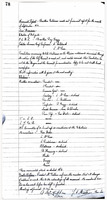 HREU Local 28 Response to White Waitresses in Chinatown Unemployment A the Regular Business Meeting of Local 28 held October 4, 1937, a resolution was unanimously passed to send a letter to Vancouver City Council saying the White waitresses in the Chinese restaurants "dismissed through the actions of City Council be supported by the Council at the same rate of pay they formerly received from their Chinese employers" as the women had been denied relief. The Hotel and Restaurant Employees Union Local 28 minutes to not include a copy of the letter, who brought the issue forward, or the response of the City.
HREU Local 28 Response to White Waitresses in Chinatown Unemployment A the Regular Business Meeting of Local 28 held October 4, 1937, a resolution was unanimously passed to send a letter to Vancouver City Council saying the White waitresses in the Chinese restaurants "dismissed through the actions of City Council be supported by the Council at the same rate of pay they formerly received from their Chinese employers" as the women had been denied relief. The Hotel and Restaurant Employees Union Local 28 minutes to not include a copy of the letter, who brought the issue forward, or the response of the City. -
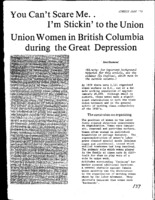 You Can't Scare Me...I'm Stickin' to the Union: Women in British Columbia During the Great Depression A history of the organizing women in the 1930s. Constraints on labour, Women's labour leagues, fishing industry militancy, restaurant strikes, domestic workers conditions, garment workers, saleswomen,
You Can't Scare Me...I'm Stickin' to the Union: Women in British Columbia During the Great Depression A history of the organizing women in the 1930s. Constraints on labour, Women's labour leagues, fishing industry militancy, restaurant strikes, domestic workers conditions, garment workers, saleswomen, -
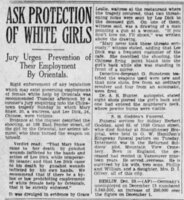 Ask Protection for White Girls: Jury Urges Prevention of Their Employment by Orientals Coroner's Jury, on the murder of 20-year-old waitress, Mary Shaw, recommend "rigid enforcement ...of any legislation governing the employment of female white help by Orientals."
Ask Protection for White Girls: Jury Urges Prevention of Their Employment by Orientals Coroner's Jury, on the murder of 20-year-old waitress, Mary Shaw, recommend "rigid enforcement ...of any legislation governing the employment of female white help by Orientals." -
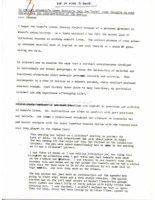 Do women trade unionists tell the truth? Some thoughts on oral history and the intrepretation of the past. An essay by Sara Diamond arguing for the value of women's subjectivities related to everyday lives as recorded in oral histories. A notation on the top of the page in Diamond's handwriting suggests this might become the intro to her unpublished manuscript on women's labour history in British Columbia.
Do women trade unionists tell the truth? Some thoughts on oral history and the intrepretation of the past. An essay by Sara Diamond arguing for the value of women's subjectivities related to everyday lives as recorded in oral histories. A notation on the top of the page in Diamond's handwriting suggests this might become the intro to her unpublished manuscript on women's labour history in British Columbia. -
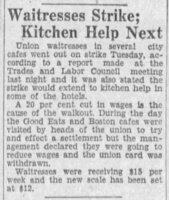 1931 Vancouver Waitress Strike: News and opinion sample Samples of letters to the editor and news reports about the Vancouver 1931 waitress strike. The strike was called on February 3, 1931. The strike was only minimally covered by the two leading newspaper publishers in British Columbia: The Province and the The Vancouver Sun. Responses to letters to the editor and their replies show a back and forth both sides of the battling parties. Examples of how union members use public forums to educate and rebutt. Feb 4 - Feb 25, 1931.
1931 Vancouver Waitress Strike: News and opinion sample Samples of letters to the editor and news reports about the Vancouver 1931 waitress strike. The strike was called on February 3, 1931. The strike was only minimally covered by the two leading newspaper publishers in British Columbia: The Province and the The Vancouver Sun. Responses to letters to the editor and their replies show a back and forth both sides of the battling parties. Examples of how union members use public forums to educate and rebutt. Feb 4 - Feb 25, 1931. -
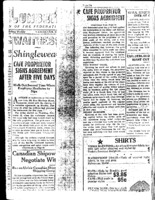 Crescent Cafe Strike Feb 11-15, 1937: Media coverage On Feburary 11, 1937, non-union waitresses of the Crescent Cafe, 251 East Hastings, went on strike for higher wages. The Crescent Cafe was part of the relief restaurant network. The waitresses joined the Hotel and Restaurant Employees Union Local 28 shortly after walking out and Business Agent William "Bill" Stewart completed the initial negotiations on February 15 for a 2-week contract setting a union wage scale of $14 per week for experienced waitresses, $12 for new waitresses, and meals. This contract was "pending further investigations on the cost of its operation." [15 Feb Local 28 Regular Meeting minutes]. There is no follow-up in later minutes. In an unrelated news article the cafe manager is recorded as Mr. Jean Ming, suggesting the Crescent was Chinese-owned. If so, this might have been the first of its kind to be signed by Local 28. Newspaper coverage was minimal with The Province covering the start and end of the strike. Coverage by The Lumber Worker detailed the tactics of the striking waitresses and how the HREU negotiated with a reluctant employer.
Crescent Cafe Strike Feb 11-15, 1937: Media coverage On Feburary 11, 1937, non-union waitresses of the Crescent Cafe, 251 East Hastings, went on strike for higher wages. The Crescent Cafe was part of the relief restaurant network. The waitresses joined the Hotel and Restaurant Employees Union Local 28 shortly after walking out and Business Agent William "Bill" Stewart completed the initial negotiations on February 15 for a 2-week contract setting a union wage scale of $14 per week for experienced waitresses, $12 for new waitresses, and meals. This contract was "pending further investigations on the cost of its operation." [15 Feb Local 28 Regular Meeting minutes]. There is no follow-up in later minutes. In an unrelated news article the cafe manager is recorded as Mr. Jean Ming, suggesting the Crescent was Chinese-owned. If so, this might have been the first of its kind to be signed by Local 28. Newspaper coverage was minimal with The Province covering the start and end of the strike. Coverage by The Lumber Worker detailed the tactics of the striking waitresses and how the HREU negotiated with a reluctant employer. -
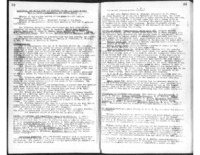 VDTLC Minutes - Research selection 1947-1949 VDTLC scanned minutes various years, related to Case Study 1 research spreadsheet CVA VDTLC Minutes 1930-1948 . This research selection covers the Vancouver and New Westminster District Trades and Labour Council meeting minutes from 1947-1949.
VDTLC Minutes - Research selection 1947-1949 VDTLC scanned minutes various years, related to Case Study 1 research spreadsheet CVA VDTLC Minutes 1930-1948 . This research selection covers the Vancouver and New Westminster District Trades and Labour Council meeting minutes from 1947-1949. -
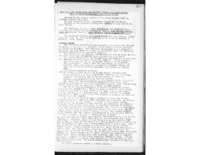 VDTLC Minutes - Research selection 1944 - 1946 VDTLC scanned minutes various years, related to Case Study 1 research spreadsheet CVA VDTLC Minutes 1930-1948 . This research selection covers the Vancouver and New Westminster District Trades and Labour Council meeting minutes from 1944-1946.
VDTLC Minutes - Research selection 1944 - 1946 VDTLC scanned minutes various years, related to Case Study 1 research spreadsheet CVA VDTLC Minutes 1930-1948 . This research selection covers the Vancouver and New Westminster District Trades and Labour Council meeting minutes from 1944-1946. -
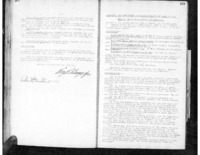 [Vancouver and New Westminster District Trade and Labor Council 1937-1938] Minute books of the Vancouver and New Westminster District Trades and Labor Council. Includes Regular, Executive, and Special Meetings.
[Vancouver and New Westminster District Trade and Labor Council 1937-1938] Minute books of the Vancouver and New Westminster District Trades and Labor Council. Includes Regular, Executive, and Special Meetings. -
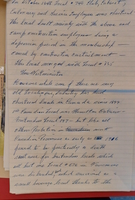 Scrapbook: merger Selected images taken of items from Fonds AM723, File 7. File contains records chronicling the amalgamation of Locals 28, 676 and 835 to form one union, Local 40.
Scrapbook: merger Selected images taken of items from Fonds AM723, File 7. File contains records chronicling the amalgamation of Locals 28, 676 and 835 to form one union, Local 40. -
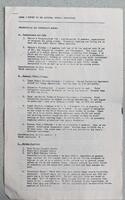 [SORWUC Local 1: Unit Reports NSC, Restaurants, Pubs 1977] Local 1 Unit Report to the National Special Convention. A. Restaurants and Pubs Bimini's and Church's Chicken. June 23/24 1977
[SORWUC Local 1: Unit Reports NSC, Restaurants, Pubs 1977] Local 1 Unit Report to the National Special Convention. A. Restaurants and Pubs Bimini's and Church's Chicken. June 23/24 1977 -
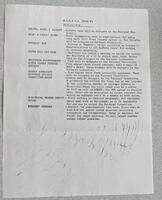 [SORWUC Local 1 Unit Reports:Victory at Biminis] Local 1 Unit Reports abt. Feb 1977. Meeting with Bimini's re 1st contract.
[SORWUC Local 1 Unit Reports:Victory at Biminis] Local 1 Unit Reports abt. Feb 1977. Meeting with Bimini's re 1st contract. -
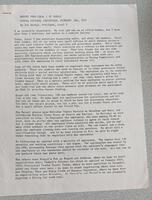 [Report SORWUC national Convention 1977] Report by Pat Barter, President, Local 1 of SORWUC for the National Convention held Feb 5, 1977. Includes an update on Biminis and Church's Chicken organizing.
[Report SORWUC national Convention 1977] Report by Pat Barter, President, Local 1 of SORWUC for the National Convention held Feb 5, 1977. Includes an update on Biminis and Church's Chicken organizing. -
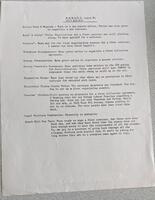 [SORWUC Local 1 Unit Reports] SORWUC Local 1Unit Reports [abt. Feb 1977]. Brief reports on the status of all actions, including that the first negotiation meeting with Bimini Neighbourhood Pub.
[SORWUC Local 1 Unit Reports] SORWUC Local 1Unit Reports [abt. Feb 1977]. Brief reports on the status of all actions, including that the first negotiation meeting with Bimini Neighbourhood Pub. -
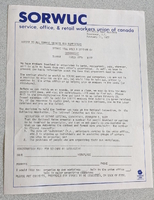 [Notice to SORWUC Members and Supporters: Organizing Seminar] Notice of an Organizing Seminar to be held March 27, 1977. These seminars were part of SORWUC's education programs aimed to train and encourage workers to initiate unions in their workplaces.
[Notice to SORWUC Members and Supporters: Organizing Seminar] Notice of an Organizing Seminar to be held March 27, 1977. These seminars were part of SORWUC's education programs aimed to train and encourage workers to initiate unions in their workplaces. -
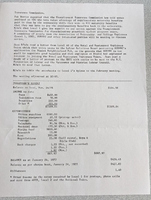 [Hotel and Restaurant Employees Union Loc 40 letter to SORWUC] Jean Rands reads a letter from Hotel and Restaurant Employees Union Local 40 written to the Labour Relations Board protesting SORWUC's application to represent Bimini Neighbourhood Pub.
[Hotel and Restaurant Employees Union Loc 40 letter to SORWUC] Jean Rands reads a letter from Hotel and Restaurant Employees Union Local 40 written to the Labour Relations Board protesting SORWUC's application to represent Bimini Neighbourhood Pub. -
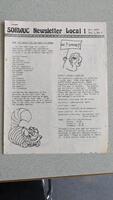 [SORWUC Newsletter Local 1 Oct. 1977 Vol.1, No. 2] The Negotiating Committee serves notice that a strike vote has been called after 8 months of negotiating with Bimini Neighbourhood Pub. Includes wage rates for servers.
[SORWUC Newsletter Local 1 Oct. 1977 Vol.1, No. 2] The Negotiating Committee serves notice that a strike vote has been called after 8 months of negotiating with Bimini Neighbourhood Pub. Includes wage rates for servers. -
 City Cancels 3 Cafe Licenses of Chinese (Sep, 16, 1937) The City cancels the licenses of three Vancouver Chinese cafes (Hong Kong Cafe, Gee Kong Cafe, and B.C. Royal Cafe) over dispute on the hiring of White waitresses to work in their cafes. Denis Murphy, (Murphy, Freeman and Murphy) is the cafes' counsel.
City Cancels 3 Cafe Licenses of Chinese (Sep, 16, 1937) The City cancels the licenses of three Vancouver Chinese cafes (Hong Kong Cafe, Gee Kong Cafe, and B.C. Royal Cafe) over dispute on the hiring of White waitresses to work in their cafes. Denis Murphy, (Murphy, Freeman and Murphy) is the cafes' counsel. -
 Jonnie Rankin Interview [Parts 2 and 3] In Part 2 of 3, Johnnie Rankin discusses the position of women within the Boilermakers Union and the types of jobs she worked at the shipyard. She also discusses childcare, equal pay, and the existence of issues specific to women. She talks about what she learned from the trade unions, and how working changed her life. Finally, she discusses working in restaurants and approaching the Hotel and Restaurant Employees Union. In Part 3 of 3, Johnnie Rankin discusses organizing in restaurants, going to business school, the 1946 strike and the role of women within it, the creation of the Labour Theatre Guild, and the political impact working during the war had on her.
Jonnie Rankin Interview [Parts 2 and 3] In Part 2 of 3, Johnnie Rankin discusses the position of women within the Boilermakers Union and the types of jobs she worked at the shipyard. She also discusses childcare, equal pay, and the existence of issues specific to women. She talks about what she learned from the trade unions, and how working changed her life. Finally, she discusses working in restaurants and approaching the Hotel and Restaurant Employees Union. In Part 3 of 3, Johnnie Rankin discusses organizing in restaurants, going to business school, the 1946 strike and the role of women within it, the creation of the Labour Theatre Guild, and the political impact working during the war had on her. -
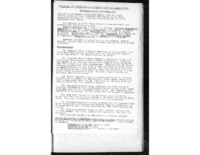 [CVA VDTLC 1944 Jul-Dec] Minutes of the Vancouver and New Westminster District Trades and Labor Council. Researcher scan of microfilm reel, part of City of Vancouver Archive Fonds AM307, Vancouver and District Trades and Labour Council fonds : 1889-1961.
[CVA VDTLC 1944 Jul-Dec] Minutes of the Vancouver and New Westminster District Trades and Labor Council. Researcher scan of microfilm reel, part of City of Vancouver Archive Fonds AM307, Vancouver and District Trades and Labour Council fonds : 1889-1961. -
 Daisy Brown Interview Daisy Brown was the office manager of the Hotel, and Restauarant Employees Union Local 28. She discusses her years with the Hotel and Restaurant Employees Union and building service union’s joint campaign to organize Vancouver hotels 1946-1947; the high number of single women parents and deserted wives working in the industry; the weakness of the union in comparison to industrial or skilled craft unions due to isolation of the workers; the difficulties the transient nature of the work and continuous shifts posed for organizers; issues of overtime, shift changes, uniforms, seniority; establishing the 40-hour work week; The Only Fish and Chips and Love’s Cafe, Vancouver; deposing the local HREU leadership in 1947 barring them from the office and membership in the union because of their left leanings.
Daisy Brown Interview Daisy Brown was the office manager of the Hotel, and Restauarant Employees Union Local 28. She discusses her years with the Hotel and Restaurant Employees Union and building service union’s joint campaign to organize Vancouver hotels 1946-1947; the high number of single women parents and deserted wives working in the industry; the weakness of the union in comparison to industrial or skilled craft unions due to isolation of the workers; the difficulties the transient nature of the work and continuous shifts posed for organizers; issues of overtime, shift changes, uniforms, seniority; establishing the 40-hour work week; The Only Fish and Chips and Love’s Cafe, Vancouver; deposing the local HREU leadership in 1947 barring them from the office and membership in the union because of their left leanings. -
 Elizabeth Wilson interview Audio and transcript of Sara Diamond's interview with Elizabeth Wilson.
Elizabeth Wilson interview Audio and transcript of Sara Diamond's interview with Elizabeth Wilson. -
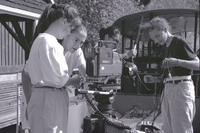 Women's Labour History Project The Women’s Labour History Project (WLHP), 1978-1995, was a non-profit society founded and led by Sara Diamond and supported by a dynamic group of women such as feminist activist and Amelia Productions member,Billie Carroll; Jennifer Brock Abbott (The Corporation); artist, policy maker, and thought leader, Zainub Verjee, and many others. The WLHP was initially inspired by the need for role models that arose during the wave of B.C. feminist union organizing in the 1970s and 1980s. It was committed to uncovering the historical roles women played within labour organizations and working-class communities. The WLHP combined archival research, oral histories, and contextual, primary and secondary ethnographic and historical research. Its outputs included the first annotated bibliography of resources for women’s labour in B.C. located in archives throughout the province; as well as publications, single-channel video, media installations, photographic exhibitions, television programs, radio series, curriculum, workshops and presentations. The WLHP was known for its creative and experimental approaches to video, combining traditional documentary treatments, docudrama, and archival images; remediation strategies that now dominate discussions regarding archival resources and new media.
Women's Labour History Project The Women’s Labour History Project (WLHP), 1978-1995, was a non-profit society founded and led by Sara Diamond and supported by a dynamic group of women such as feminist activist and Amelia Productions member,Billie Carroll; Jennifer Brock Abbott (The Corporation); artist, policy maker, and thought leader, Zainub Verjee, and many others. The WLHP was initially inspired by the need for role models that arose during the wave of B.C. feminist union organizing in the 1970s and 1980s. It was committed to uncovering the historical roles women played within labour organizations and working-class communities. The WLHP combined archival research, oral histories, and contextual, primary and secondary ethnographic and historical research. Its outputs included the first annotated bibliography of resources for women’s labour in B.C. located in archives throughout the province; as well as publications, single-channel video, media installations, photographic exhibitions, television programs, radio series, curriculum, workshops and presentations. The WLHP was known for its creative and experimental approaches to video, combining traditional documentary treatments, docudrama, and archival images; remediation strategies that now dominate discussions regarding archival resources and new media. -
 Chris Waddell interview Audio and transcript of Sara Diamond's interview with Chris Waddell.
Chris Waddell interview Audio and transcript of Sara Diamond's interview with Chris Waddell. -
 Pearl Moreau interview Audio and transcript of Sara Diamond's interview with Pearl Moreau.
Pearl Moreau interview Audio and transcript of Sara Diamond's interview with Pearl Moreau.
